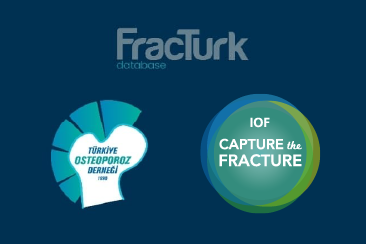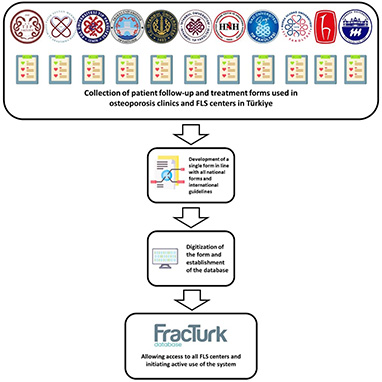FracTurk Database: A National Initiative for Standardising Osteoporosis Care in Türkiye

Fragility fractures are a major concern for public health in Türkiye and are associated with a substantial (and escalating) health and financial burden. Approximately 255,000 fragility fractures occurred in the year 2019 with osteoporosis-related costs at an estimated $455 million (USD) in the same year. With the anticipated growth in the older adult population and no changes in current policies, the incidence of fragility fractures is projected to rise by over 50% within the next 15 years.
Fracture Liaison Services (FLS) play a central role in managing patients with osteoporosis and bone fragility, as well as in preventing future fractures. However, one of the key challenges faced by FLS coordinators is time constraints. Adequate time is essential for thoroughly assessing patient needs, coordinating care, and ensuring adherence to treatment plans. These limitations can potentially affect the quality of care provided.
Introducing standardised osteoporosis care within FLS at a regional or national level can address time constraints by providing clear, evidence-based guidelines that streamline processes and reduce inefficiencies. This strategy encourages consistent, high-quality patient care while improving treatment outcomes. It also supports better data collection, enabling coordinators to track progress, identify areas for improvement and benchmark against regional and national standards.
FracTurk – a locally developed patient-tracking system
On November 7th, 2023, the Turkish Osteoporosis Society (TOS) officially launched FracTurk, a locally developed FLS patient-tracking database system. Mentors from the Capture the Fracture® programme played a key role in the development of the FracTurk Database, offering feedback throughout its creation and facilitating the coordination of centres nationwide.
Prof. Dr. Şansın Tüzün, faculty member at İstanbul University – Cerrahpaşa, and president of the Turkish Osteoporosis Society stated: “The FracTurk Database aims to coordinate FLS centres and promote the standardisation of treatment protocols. Additionally, it collects and analyses multicentre data on osteoporosis and related fractures across Türkiye. This dual approach enhances understanding of disease prevalence, risk factors, and treatment outcomes, contributing to evidence-based strategies for preventing, diagnosing, and managing osteoporosis at a national level.”
Over the past year, the FracTurk Database has been instrumental in collecting and storing comprehensive data to support efficient patient management. It includes demographic details such as age, gender, BMI, and residency information, including patterns of seasonal migration. Clinical and medical histories are meticulously recorded, encompassing detailed fracture histories, the location and clinical service of initial diagnosis, gynaecological history for female patients, and risk factors like smoking, alcohol consumption, glucocorticoid use, and rheumatoid arthritis.
Diagnostic data is thoroughly integrated, including bone mineral density measurements, FRAX-based fracture risk assessments tailored to the Turkish population, and radiological and laboratory test results, alongside additional tests recommended in the latest Turkish consensus report. Nutritional and lifestyle information, such as dietary habits, physical activity levels, and adherence to preventive measures, is also captured.
The database further incorporates treatment and follow-up data through standardised forms, drug interaction records, medication usage, follow-up schedules, and clinician notifications. Additionally, institutional performance metrics are tracked, enabling the evaluation and comparison of FLS activities across centres. This extensive dataset underpins culturally adapted care, promotes national standardisation, and supports advanced research into osteoporosis and fragility fractures.
Addressing challenges in implementation
Several challenges had to be overcome before the FracTurk Database could be effectively implemented. These included issues with data standardisation, integration with hospital systems, and ensuring equitable access across diverse regions. For example, consolidating follow-up and treatment forms across multiple institutions required nine iterative revisions to achieve consensus and alignment with cultural and clinical practices. Technical difficulties also arose, such as integrating the database into existing hospital workflows and addressing security concerns. The database then needed optimisation to reduce the time spent on manual data entry and minimise gaps in continuity of care. Additionally, ensuring equitable access to digital infrastructure, especially in underserved regions, posed a significant challenge, potentially limiting the system's broader adoption and effectiveness.
Prof. Dr. Ülkü Akarirmak faculty member at İstanbul University – Cerrahpaşa and founding member of the Turkish Osteoporosis Society, shared her advice for other countries interested in developing similar initiatives. “Engaging stakeholders early is essential to ensure the system addresses diverse clinical and cultural needs. Additionally, planning for scalability is key, as it enables the system to expand and adapt to future clinical or technological advancements. We recommend continuously refining the initiative through an iterative development process and ensuring seamless integration with hospital information systems to minimise disruptions and promote adoption. Finally, addressing digital disparities through infrastructure investment, particularly in underserved areas, ensures equitable access. By focusing on these aspects, countries can implement tailored FLS databases and benefit from FracTurk's lessons.”

Positive feedback and steady growth across the country
As of January 2025, 24 centres across Türkiye are actively using the FracTurk Database. Feedback has been largely positive, highlighting its potential to standardise and improve post-fracture care. Users have praised its clinical decision-support tools, such as the FRAX risk calculator and drug interaction checker, as well as its culturally adapted features. However, challenges such as time-consuming data entry and integration issues remain. But despite these challenges, the FracTurk Database has been witnessing a steady growth in registered patients and active users.
Although no formal research studies have yet been conducted to evaluate the impact of the FracTurk Database on patient outcomes, preliminary observations and projections suggest significant potential benefits for both FLS centres and their patients. The database's integration of standardised follow-up forms, clinical decision support tools, and reminders for clinicians is expected to improve adherence to best practices and streamline patient management. Furthermore, the system facilitates systematic monitoring of patient outcomes, promoting a data-driven approach to care that could enhance clinical results and operational efficiency while reducing administrative burdens.
While empirical validation is needed, the FracTurk Database shows promise in improving post-fracture care and advancing the effectiveness of FLS centres in Türkiye. FracTurk was showcased at the 8th National Congress on Osteoporosis, Osteoarthritis, and Musculoskeletal System Diseases, organised by TOS. This event provided an opportunity to share the database's features, objectives, and potential benefits with a broad audience of healthcare professionals and researchers, fostering awareness and encouraging adoption among FLS centres across Türkiye.
Future Plans for FracTurk – a robust, adaptable and impactful tool
Future plans aim to expand FracTurk internationally, collaborating with global FLS systems and osteoporosis networks. Additionally, plans include integrating the FracTurk Database with national and international healthcare systems to streamline data flow and improve accessibility for clinicians. The integration of advanced analytics, such as predictive algorithms and machine learning, is also envisioned to enhance clinical decision-making by providing tailored recommendations based on patient-specific characteristics.
The team also envision expanding the database beyond FLS to encompass broader aspects of osteoporosis management. This includes incorporating data on risk factors, comorbid conditions, and preventive measures, making it a comprehensive tool for managing both fragility fractures and osteoporosis. Enhancing its usability for both FLS centres and general osteoporosis clinics will ensure that it addresses the diverse needs of healthcare providers.
These efforts aim to make FracTurk a robust, adaptable, and impactful tool for improving bone health and post-fracture care both within Türkiye and internationally.